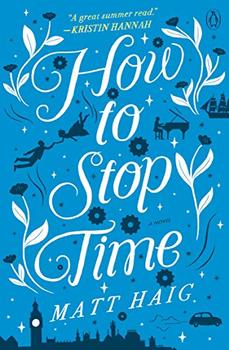Summary | Excerpt | Reviews | Beyond the Book | Readalikes | Genres & Themes | Author Bio

Another reason people don't know about us is that we're protected. By a kind of organisation. Anyone who does discover our secret, and believes it, tends to find their short lives are cut even shorter. So the danger isn't just from ordinary humans.
It's also from within.
Sri Lanka, three weeks ago
Chandrika Seneviratne was lying under a tree, in the shade, a hundred metres or so behind the temple. Ants crawled over her wrinkled face. Her eyes were closed. I heard a rustling in the leaves above and looked up to see a monkey staring down at me with judging eyes.
I had asked the tuk-tuk driver to take me monkey spotting at the temple. He'd told me this red-brown type with the near bald face was a rilewa monkey.
'Very endangered,' the driver had said. 'There aren't many left. This is their place.'
The monkey darted away. Disappeared among leaves.
I felt the woman's hand. It was cold. I imagined she had been lying here, unfound, for about a day. I kept hold of her hand and found myself weeping. The emotions were hard to pin down. A rising wave of regret, relief, sorrow and fear. I was sad that Chandrika wasn't here to answer my questions. But I was also relieved I didn't have to kill her. I knew she'd have had to die. This relief became something else. It might have been the stress or the sun or it might have been the egg hoppas I'd had for breakfast, but I was now vomiting. It was in that moment that it became clear to me. I can't do this any more.
There was no phone reception at the temple, so I waited till I was back in my hotel room in the old fort town of Galle tucked inside my mosquito net sticky with heat, staring up at the pointlessly slow ceiling fan, before I phoned Hendrich.
'You did what you were supposed to do?' he said.
'Yes,' I said, which was halfway to being true. After all, the outcome had been the one he'd asked for. 'She is dead.' Then I asked what I always asked. 'Have you found her?'
'No,' he said, as always. 'We haven't. Not yet.'
Yet. That word could trap you for decades. But this time, I had a new confidence.
'Now, Hendrich, please. I want an ordinary life. I don't want to do this.'
He sighed wearily. 'I need to see you. It's been too long.'
Los Angeles, two weeks ago
Hendrich was back in Los Angeles. He hadn't lived there since the 1920s so he assumed it was pretty safe to do so and that no one was alive who would remember him from before. He had a large house in Brentwood that served as the headquarters for the Albatross Society. Brentwood was perfect for him. A geranium-scented land of large houses tucked behind high fences and walls and hedges, where the streets were free from pedestrians and everything, even the trees, looked perfect to the point of sterile.
I was quite shocked, on seeing Hendrich, sitting beside his large pool on a sun-lounger, laptop on knee. Normally, Hendrich looked pretty much the same, but I couldn't help notice the change. He looked younger. Still old and arthritic, but, well, better than he'd done in a century.
'Hi, Hendrich,' I said, 'you look good.'
He nodded, as if this wasn't new information. 'Botox. And a brow lift.'
He wasn't even joking. In this life he was a former plastic surgeon. The back story was that after retiring he had moved from Miami to Los Angeles. That way he could avoid the issue of not having any formerlocal clients. His name here was Harry Silverman. ('Silverman. Don't you like it? It sounds like an ageing superhero. Which I kind of am.')
I sat on the spare lounger. His maid, Rosella, came over with two sunset-coloured smoothies. I noticed his hands. They looked old. Liver spots and baggy skin and indigo veins. Faces could lie easier than hands could.
Excerpted from How to Stop Time by Matt Haig. Copyright © 2018 by Matt Haig. All rights reserved. No part of this excerpt may be reproduced or reprinted without permission in writing from the publisher.
Finishing second in the Olympics gets you silver. Finishing second in politics gets you oblivion.
Click Here to find out who said this, as well as discovering other famous literary quotes!
Your guide toexceptional books
BookBrowse seeks out and recommends the best in contemporary fiction and nonfiction—books that not only engage and entertain but also deepen our understanding of ourselves and the world around us.